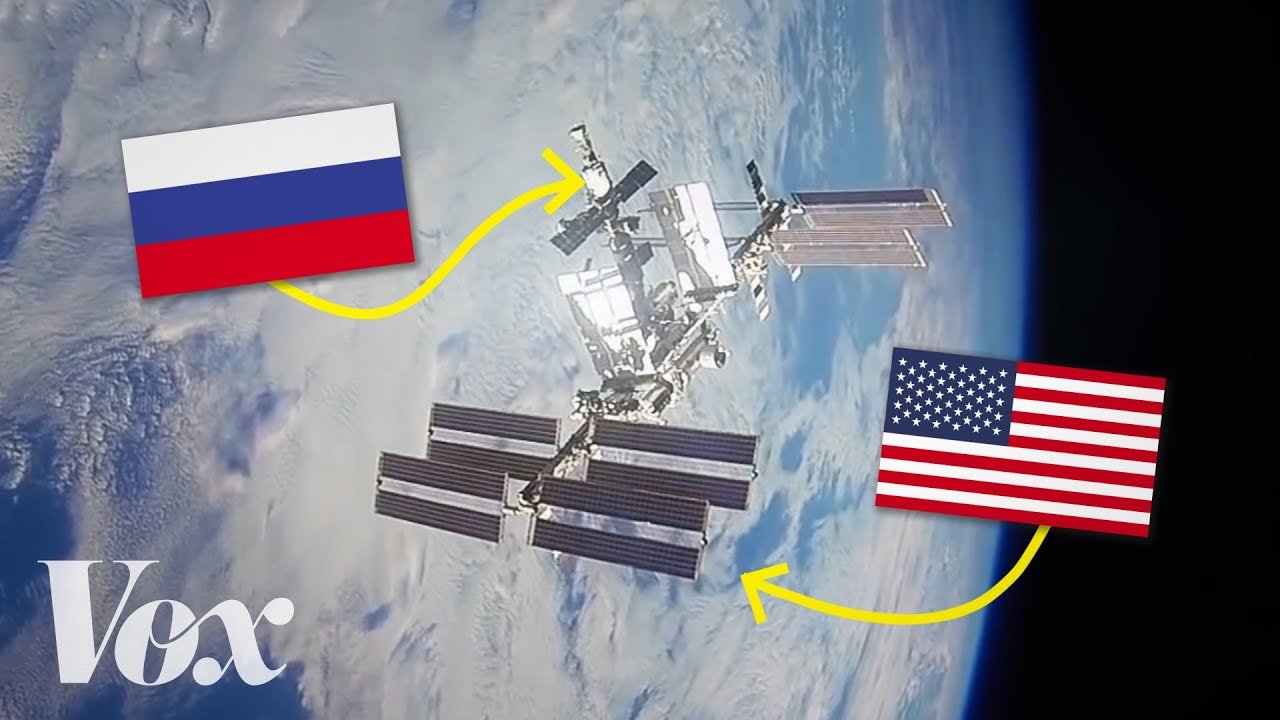Russia and the United States disagree on almost everything: How to lead their countries, how to treat their people, how to respect one another, where you can and can’t put nuclear weapons, and what draws the limits of war. But who could have ever known that both countries work together peacefully in space?
A History
Russia and the United States were not always together in space. In fact, originally they were against each other in an event known as the “Space Race.” From 1957-1974, the two battled for space supremacy. Russia scored some early victories, launching the first man and woman into space. The United States, however, took a different path and chose to land humans on the moon in 1969. However, Russia was not going down without a fight. They continued the space race by launching space stations into orbit and sending people there. But one day, that all changed. When both countries signed an agreement for two manned spacecraft, one American and one Russian to dock together in space. The plan was set for July 1975, and just a little while later it happened for real. America’s ice-cream shaped Apollo spacecraft and the bug-looking Soyuz spacecraft met together in Earth’s orbit and the three American astronauts and the two Russian cosmonauts spent a few days together. But soon after this event, the governments had another big disagreement and Russia and America went back into the space race against each other.
Mir Life
By 1994, America’s space agency, NASA, was in trouble. After the Challenger disaster in 1986, Congress cut a large amount of NASA’s budget. NASA had been able to kick-start the Space Shuttle program again, but with a limited budget. They couldn’t conduct long-term human experiments. Russia’s space agency, however, was doing much better; their Mir space station, the largest object ever constructed at the time, was a masterpiece. It could hold three cosmonauts for 6 full months! And with all of that space, there was a lot of possibility for conducting experiments. NASA noticed this and thought of an idea: They could put an American onboard the Russian space station! They would be able to do several long-term experiments and see what would happen. To try and befriend an enemy, they decided to give them a gift - a new docking port to Mir that could fit with the American docking ports on the space shuttle. The first astronaut who came to Mir was Norman Thagard, who didn’t enjoy his stay, because of what happened in the first couple of weeks. While he was running on a treadmill, the rubber band holding him down snapped and smacked him in the eye, damaging his eyesight. Another astronaut who stayed aboard witnessed a 5-minute fire that spread across the space station quickly. When he tried to use a fire extinguisher at the blaze, he discovered that it didn’t work. He scrambled to find another one, but then he found out that this one was also useless. Finally, a cosmonaut found a third extinguisher that worked, and the fire was put out. Many astronauts said that when the space shuttle came to take them down, it was like a miracle to them. The Americans also didn’t like the Russian’s carelessness. NASA makes sure that the American astronauts are clean of vaping products and alcoholic beverages. But Russia at the time, didn’t have those rules, and often lit cigarettes onboard the space station, making Mir smell very bad. Russian cosmonauts also never took out their junk, and Mir was crowded with lots of dirty socks and old experiments that were never taken out. It was considered very bad luck at NASA to go to Mir, and most astronauts were traumatized after they returned home. They often lost an unhealthy amount of weight. And some even resigned from NASA after they returned to Earth.
Goodbye Mir
NASA wanted to build a large space station, and they had already added several space agencies. But these space agencies didn’t have the budget to help NASA build the space station, and they couldn’t build and launch their own rockets. They could only give NASA astronauts robotic arms and modules. So NASA decided to turn to Russia for help, who were also having problems. After the Soviet Union fell, they were left with limited money and were having trouble keeping Mir alive. So NASA asked Russia if they would like to join the International Space Station. Russia agreed, but NASA and the other space agencies also had some requests if they were to join the space station. First, they wanted to get rid of Russia’s smoking habits. Next, they wanted to make sure that they would use their own Soyuz spacecraft to get astronauts up into space. And last, they also requested that Mir would be sent down into Earth’s atmosphere. Mir would be a large piece of space junk that could cause harm to the new space station. However, Russia loved its space station, it was their one-in-a-million jewel, and they didn’t want to send it down to burn up into Earth’s atmosphere. But in the end, they agreed. And after the last crew completed their stay in June of 1995, they sent a spacecraft to pull it towards Earth. Mir burned up in Earth’s atmosphere in March of 2001.
A New Era
The International Space Station was the next step in the United States and Russia’s relationship. Russia would supply the space station with a propulsion system, while the United States would supply a power system. And the idea became true. Between 1998 and 2011, the USA and Russia would supply the space station with several different modules and solar panels. And by the time the space shuttle program ended in July 2011, the United States was closer than ever to its relationship with Russia. And from 2012-2020, American astronauts only took the Soyuz spacecraft to the ISS. NASA certainly had established a strong and strange bond with an enemy. And even though the two country's governments disagreed with each other, the scientists worked together in space.
A Damage Done And a Hopeful Recovery
But unfortunately in 2022, that relationship was almost torn apart. When Russian troops invaded Ukraine and started a war. The United States supported the underdog Ukraine and funded them with money and weapon supplies. This made Russia very unhappy, and its space agency would threaten to crash the ISS into the United States. Which was a threat that the US and its partners would never take lightly. Russia would then claim that they would stop sending American astronauts into space, and even leave the International Space Station program completely. Of course, NASA didn’t support this idea, but Russia won’t listen to their reasoning. By June 2022, it seemed like Russia was leaving the program for good. They even released blueprints for a space station that they claimed would test nuclear weapons in space. This upset and scared the US citizens and government greatly, and rumors started going around about a missile strike in space. But Russia seemed to have a change of heart, and by the next month in July, they asked if they could rejoin the space station. But they claimed that they would still leave in 2026. But more recently they have delayed that to 2028 at the latest. In September 2022, Russia started carrying Americans back up to the ISS again.
The ISS is supposed to last until 2030 before it is deorbited in 2031.
With the confusing history between the two countries, they are still able to work together in space even though their governments disagree with each other. They have shown that two enemies can work together in the right circumstances.

